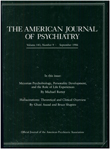How primary care physicians treat psychiatric disorders: a national survey of family practitioners
Abstract
A survey of 350 family practice physicians nationwide showed that 22.6% of their patients had significant psychiatric disorders. Physicians reported treating most psychiatric problems themselves, usually through a combination of psychotropic drugs, advice, and reassurance. The results suggest that anxiolytics are more conservatively used and referrals for mental health care more often made than past studies indicate. Physicians cited patient resistance and time limitations as the most important barriers to primary care mental health treatment, followed by limited third-party payment for mental health services, poor coordination between the primary care and mental health care sectors, and insufficient training to treat psychiatric disorders.
Access content
To read the fulltext, please use one of the options below to sign in or purchase access.- Personal login
- Institutional Login
- Sign in via OpenAthens
- Register for access
-
Please login/register if you wish to pair your device and check access availability.
Not a subscriber?
PsychiatryOnline subscription options offer access to the DSM-5 library, books, journals, CME, and patient resources. This all-in-one virtual library provides psychiatrists and mental health professionals with key resources for diagnosis, treatment, research, and professional development.
Need more help? PsychiatryOnline Customer Service may be reached by emailing [email protected] or by calling 800-368-5777 (in the U.S.) or 703-907-7322 (outside the U.S.).



